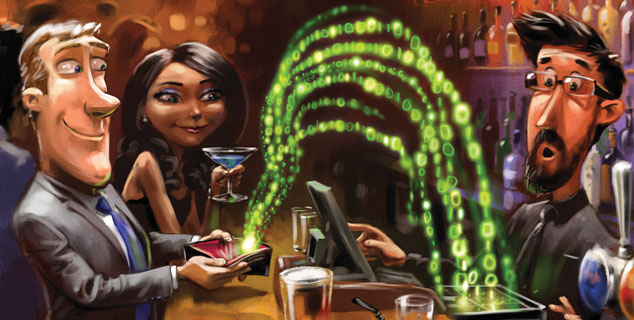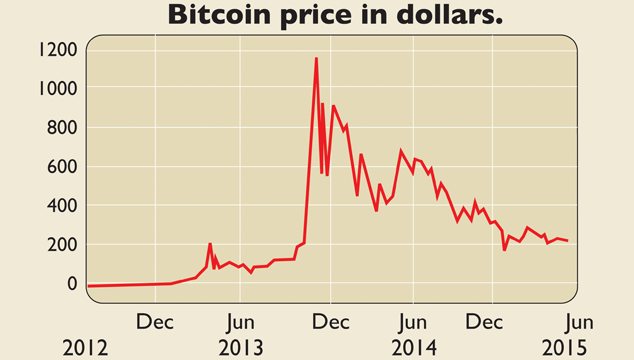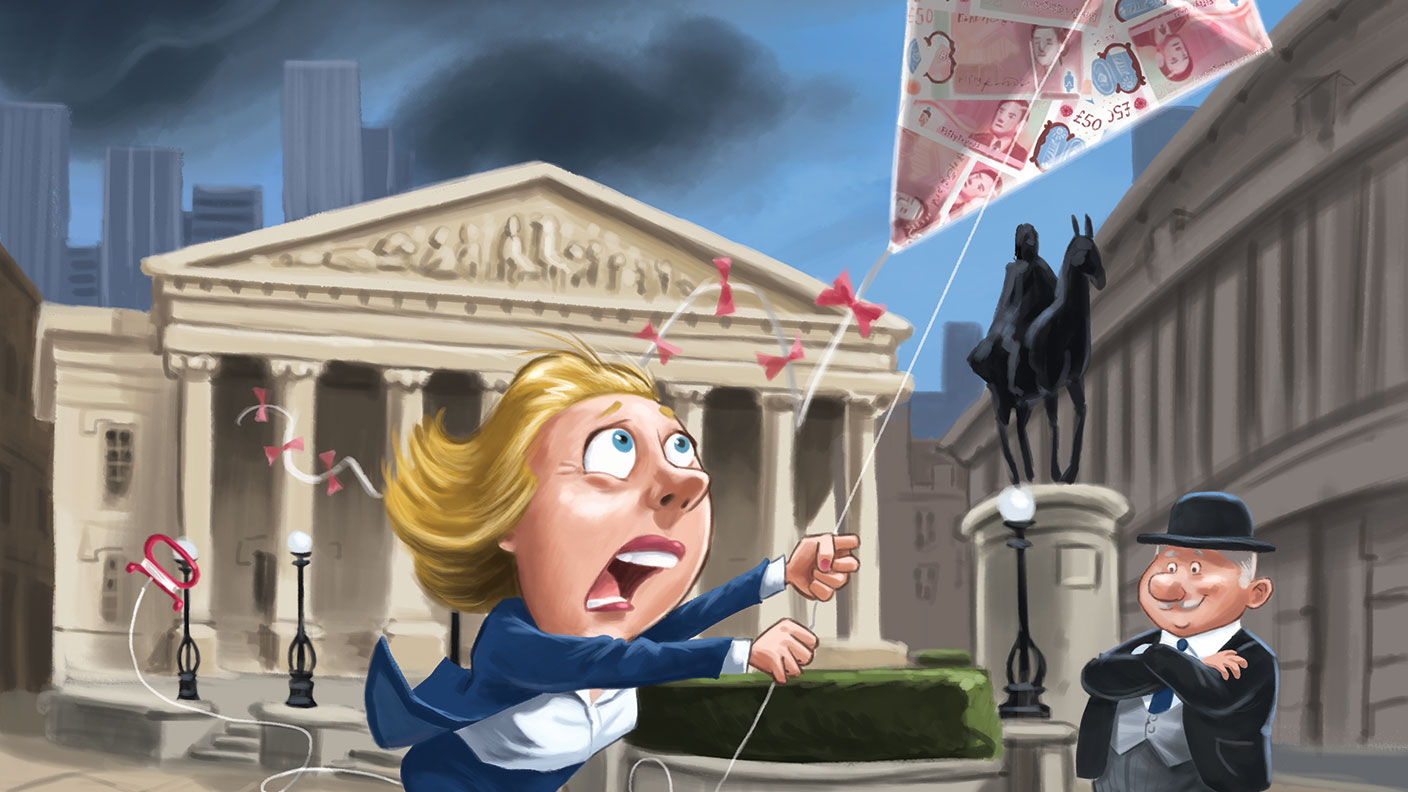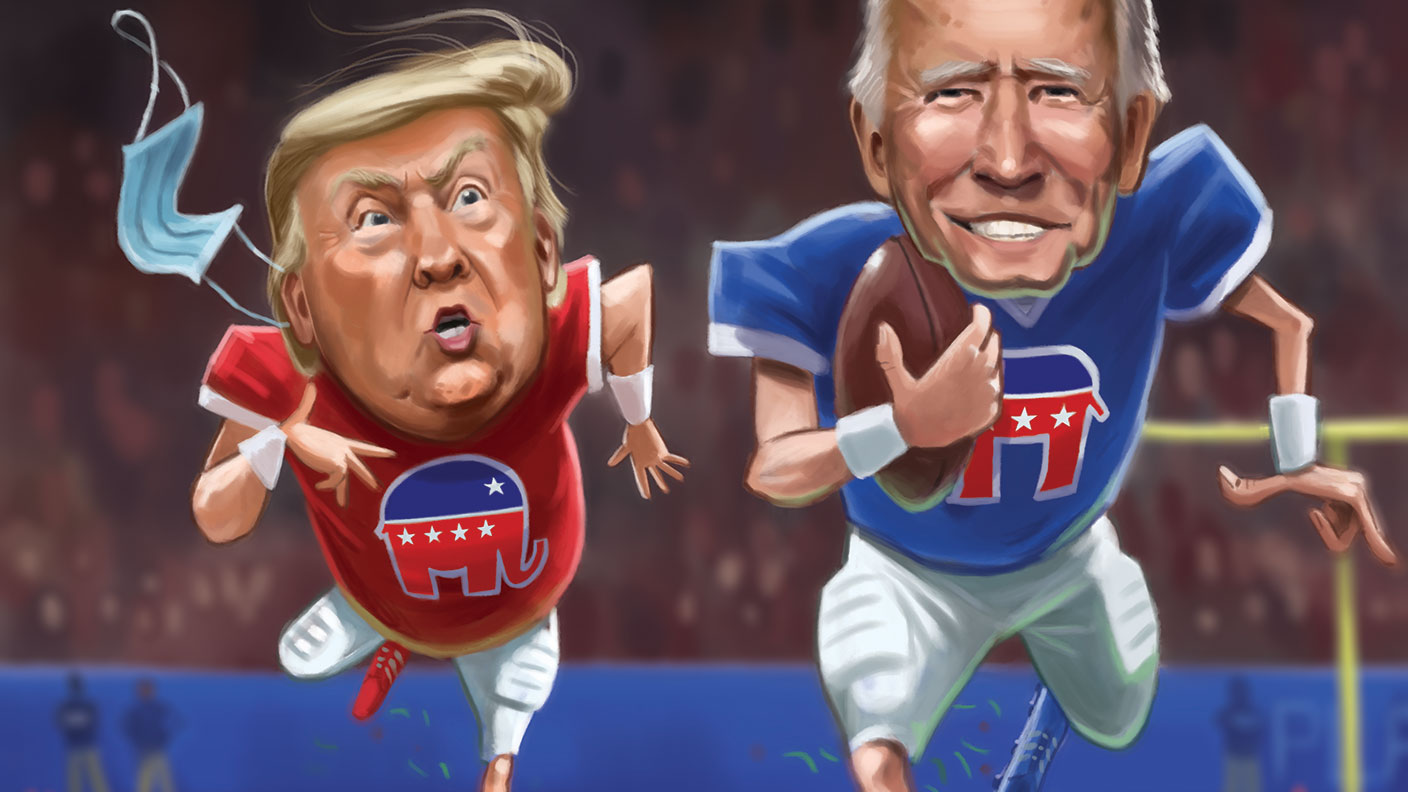Join the bitcoin revolution
Bitcoin has yet to go mainstream, but it will eventually turn our whole way of life upside down. Dominic Frisby asks whether it's time to invest in the digital currency.

Get the latest financial news, insights and expert analysis from our award-winning MoneyWeek team, to help you understand what really matters when it comes to your finances.
You are now subscribed
Your newsletter sign-up was successful
Want to add more newsletters?

Twice daily
MoneyWeek
Get the latest financial news, insights and expert analysis from our award-winning MoneyWeek team, to help you understand what really matters when it comes to your finances.

Four times a week
Look After My Bills
Sign up to our free money-saving newsletter, filled with the latest news and expert advice to help you find the best tips and deals for managing your bills. Start saving today!

The digital currency has yet to go mainstream, but it will eventually turn our whole way of life upside down, says Dominic Frisby.
Most of the money we use today is digital. Think about your own finances. In various online accounts, you'll have pounds, and maybe some dollars and euros. Perhaps you've also got air miles or supermarket rewards points. They're all tokens that can be exchanged for some kind of good or service. None exists in physical form just 3% of pounds and dollars exist as paper notes or coins they are all forms of digital money. And if you want to use any of these tokens, you have to go through a middleman be that a bank, a credit-card firm, an airline, or a supermarket.
Contrast that with cash. If you're nextto me, I can hand cash direct to you.No one else is involved. Cash remainsthe most immediate form of payment,the cheapest (making it ideal for low-value transactions) and the most private. So cash is very different from digital money. That's why computer coders have been trying to find a way to replicate the cash transaction digitally since the 1980s.
MoneyWeek
Subscribe to MoneyWeek today and get your first six magazine issues absolutely FREE

Sign up to Money Morning
Don't miss the latest investment and personal finances news, market analysis, plus money-saving tips with our free twice-daily newsletter
Don't miss the latest investment and personal finances news, market analysis, plus money-saving tips with our free twice-daily newsletter
But by the early 2000s, most had given up. The problem is simple. If I send you an email, or a picture, or a video any type of digital code you can cut and paste that code and send it to hundreds, or even millions, of others. Clearly, if you can do that with money, the money is useless. It's known as the problem of "double spending". Nobody could find a way round it, without using a middleman of some kind. Until Bitcoin came along.
The genius of Satoshi Nakamoto (bitcoin's pseudonymous creator) was to invent a new system of record-keeping a vast automated database that verifies transactions. A transaction is only complete once it is recorded on that database. Once recorded, it's final and can't be undone. Each transaction is unique, and the database is public. It is maintained not by any one individual or corporation, but by computers across the bitcoin network it is decentralised.
If you want to, you could set up your computer to run the bitcoin software and maintain this database. In exchange, the network will sometimes reward you with some bitcoins. This is the process known as "mining". This amazing database, which makes the digital cash transaction possible, is known as the "blockchain".
Don't worry if this leaves you baffled. Most people don't understand how the internet works, but they still use it. Most people don't understand how a car works, but they still drive. And most people don't understand how money is created, but they still use it. (If they did understand, there would be a revolution tomorrow, as Henry Ford once put it.) The same will happen with Bitcoin and the blockchain technology.
It works look at the black markets
Now, bitcoin is still a long way away from mainstream adoption. I don't think it will ever replace the dollar or the pound. Instead, it will work alongside them rather as Friedrich Hayek envisaged in his 1976 paper, The Denationalisation of Money. But if you need proof that it works, just look at how rapidly it has been adopted by online black markets trading in illegal goods, such as drugs the Silk Road site is a high-profile example.
I'm not saying these markets are a good thing, I hasten to add but they show that bitcoin is both a practical and reliable payments system. And the savings that could be made in more legitimate parts of the financial system suggest that Bitcoin will continue to make inroads. Goldman Sachs IT analyst Roman Leal reckons that in 2013 $550bn in remittances went around the world, generating $49bn in fees. Had bitcoin been used, the fees could have shrunk by more than 90%. That's pretty irresistible stuff.Then there are "micropayments".
A persistent problem with email is spam trash that clogs up your inbox with offers of herbal pills or promises of untold wealth from odd sources. Bitcoin and blockchain could make spam a thing of the past. Traditional banking can't process micropayments payments of, say, as little as a millionth of a penny efficiently. But bitcoin can.
Spam is predicated on the sender being able to send as many emails as possible for as low a cost as possible. But let's imagine that if you want to email me, you have to make a micropayment of some kind. That'd be fine if you're only sendinga few hundred emails a day but itcould destroy the economics of spam.
It might also mean the end of free online content. Videos, news and blogs could all require a tiny, automated one-click payment to view. In the same way that you currently "like" an article, you could tip the content producer a tiny amount. The payment is so small that you'll barely notice, but taken together, it might benefit the producer if the piece of content is popular enough.
But the most interesting point about bitcoin is that there's a lot more to it than digital cash. When Nakamoto was developing bitcoin, he was working on three things. The first, as coder Charles Hoskinson tells me, "was this idea of a decentralised database, secured by a proof-of-work consensus system (the blockchain). The second was a transaction system tokens.
He wanted to see if his consensus system would be secure, if people would participate in it and if the tokens would achieve any market value without backing or promises." In both cases, he was wildly successful. However, "he had a third option", says Hoskinson, that "extended bitcoin beyond a money system". Nakamoto chose to focus on making bitcoin work. But now that it does, other coders are looking at some of the uses his blockchain technology can be put to and its potential is revolutionary.
Blockchain could change everything
"Disintermediation" is one of the buzzwords around bitcoin. When you send bitcoins to someone else, the middleman the bank or credit-card firm is "disintermediated". But this applies to all sorts of other areas too. If I want to send you a message, for example, I have to use a middleman. It might be Gmail, Twitter whomever. These middlemen promise privacy, but they all have access to what is being said, and many use our information to sell advertising space.
But using blockchain technology, programmers are creating systems that allow people to message each other without any middleman. It's a bit like hand-delivering an old-fashioned letter in an envelope. This has huge implications for privacy, not to mention online advertising. There is even a blockchain-based mobile-phone operating system being developed to challenge the duopoly of Android or Mac OS, called Trustonic.
The blockchain could also change the way we register ownership of assets. You can think of the blockchain as a structure of permanent public record that grows with each transaction. It's a highly efficient way of proving both identity and ownership. The obvious application is for recording the ownership of financial assets shares and bonds, for example. The Nasdaq is already looking at using the blockchain.
But it could extend to property and beyond the government of Honduras has just hired the services of a Texan blockchain company to build a land registry system, reports Reuters. Having a system that enables property ownership to be recognised and property rights reinforced is key to economic development, and its absence is what holds back many developing countries, as Nobel-prize winning economist Hernando de Soto has argued. The blockchain can go some way to addressing that.
Your reputation really matters
Another potential benefit for developing economies in particular is the blockchain's potential use as a way to prove identity. Just now, we use a system of usernames and passwords to prove our identities online, but it's clunky. The blockchain, says Hoskinson, is "a godsend for the next generation of ID systems. It will allow people to better authenticate themselves on the internet." Such a system could work just as well in developing Africa or Asia as in the developed world, representing a huge step forward for anything that relies heavily on verifying identities online, such as ecommerce, and providing banking services for the "unbanked".
In fact, some argue that online "reputation" tied to your online ID could eventually replace the old-fashioned credit score. Consider how the simple online review system has transformed businesses. TripAdvisor has become the world's biggest travel business without owning a single hotel or restaurant. As a consumer, I base hundreds of decisions on TripAdvisor ratings and reviews provided by other consumers like me. I bet you do too.
As a result, good TripAdvisor reviews are vital to any tourist business they are what brings in the customers. Similarly, a good eBay rating is essential to any buyer or seller on the auction website the need to maintain a good reputation enforces good practice on both sides. When I'm buying a product on Amazon, the first thing I check is the quality of the reviews from other buyers.
So your reputation or at least, your online reputation matters. And now your online reputation, as well asyour identity, can be recorded permanently and publicly on the blockchain providing a much more detailed and nuanced account of your transaction history than any credit record could. It could even have a valuable use as an international system of criminal record keeping.
Closely related to this theme of identity and ownership are new systems of notarisation the authentication of documents. Digital proof of ownership and notarisation would have huge implications for the legal profession, an industry that has so far largely avoided being disrupted by the internet. If I'm right about the identity of Nakamoto, he was actually a legal scholar, one who would have understood very well the ramifications of his invention for the legal profession. He coined the expression "smart contracts" a contract that is created, verified and enforced automatically, eliminating the need for an actual written contract, drawn up by another expensive middleman.
More radically, blockchain applications are being developed for voting. We would have known the result of the general election by 10.01pm with no need for recounts had blockchain technology been used. A rapid, secure and anonymous system of voting could make it far easier to organise referenda, and create a more direct, representative and responsive democracy.
We could even establish a "pick'n'mix" system where we could vote for individual policies rather than simply for parties. Whether politicians will embrace this is another matter, but the potential is there. I've said it before and I'll say it again: the revolution will not be televised. It will be cryptographically secured on the blockchain.
How to invest in the technology
The first thing to point out is that you have to distinguish between investing in bitcoin itself and investing in blockchain technology. These two things are, in my view, at different stages in the "hype" cycle. Bitcoin, the currency, is currently in a bear market (see the price chart below), and I don't see that changing soon. It's worth getting some to familiarise yourself with how it works (see below), but I wouldn't see it as an investment.

If you do want to speculate on the bitcoin price (a dangerous game), IG has a contract for difference that tracks it. And in the US, the Bitcoin Investment Trust (OTCQX: GBTC) tracks the price. But if you're tempted, just remember how tricky it is to buy and sell commodities profitably bitcoins are even more volatile than those.
As for blockchain technology, it's much closer to the start of the hype cycle, but that also means it's hard to gain exposure. Most firms in the sector are still private. Some are accepting investment via crowdfunding and private offerings, but in terms of listed companies, the options are limited. I'm working with a start-up, Coinworks, but I suspect it won't go public until later this year or next. Coinsilium is another company currently working towards an Aim initial public offering (coinsilium.com).
There are some Nasdaq-listed companies that have made significant investment in bitcoin and blockchain technology, but they are not pure plays. However, worthy of further investigation are WPCS International (Nasdaq: WPCS), which has developed a bitcoin trading application, and gaming giant Zynga (Nasdaq: ZNGA), which is developing systems whereby bitcoins can be used for in-app payments. And there's online retailer Overstock (Nasdaq: OSTK), which is developing a blockchain-based securities system.
How to get started with bitcoin
There are three ways to get bitcoins.You can earn them (by offering yourservices in exchange for bitcoins); buythem; or mine them. Forget miningthem these days it takes industrialquantities of power to do this. Let'sinstead look first at how to buy them.
1. The first thing you need to do isget a wallet. Go to coinbase.com, orblockchain.info, type in your emailaddress and a password, and you'llhave a wallet. You'll then be given awallet address. Make a note of it.
2. Go to bittylicious.com. Paste yourwallet address where it says "bitcoinaddress", then deposit some money say £20 either via credit card or banktransfer. Get a friend to do the same.
3. Once you and your friend are setup, practise sending each other smallamounts of money.
4. Then go to a trendy caf inShoreditch or somewhere that acceptsbitcoins, and buy yourself a cup ofcoffee and a croissant as your reward. Congratulations. You're part of thefinancial revolution.
Another buying option is availablethrough localbitcoins.com. You caneven buy them in cash this way. Thevendor will come to you and probablyeven help you to get set up.
As for earning bitcoins, once you'vefollowed step 1 above and got yourselfa wallet, simply give that addressto anyone who plans to pay you inbitcoins for your product or service,and they can pay you as easily as theycan send you an email.
Dominic Frisby is the author of Life After The State and Bitcoin: the Future of Money. For more from Dominic, read MoneyWeek's free daily email, Money Morning.
Get the latest financial news, insights and expert analysis from our award-winning MoneyWeek team, to help you understand what really matters when it comes to your finances.

-
 Average UK house price reaches £300,000 for first time, Halifax says
Average UK house price reaches £300,000 for first time, Halifax saysWhile the average house price has topped £300k, regional disparities still remain, Halifax finds.
-
 Barings Emerging Europe trust bounces back from Russia woes
Barings Emerging Europe trust bounces back from Russia woesBarings Emerging Europe trust has added the Middle East and Africa to its mandate, delivering a strong recovery, says Max King
-
 Governments will sink in a world drowning in debt
Governments will sink in a world drowning in debtCover Story Rising interest rates and soaring inflation will leave many governments with unsustainable debts. Get set for a wave of sovereign defaults, says Jonathan Compton.
-
 Why Australia’s luck is set to run out
Why Australia’s luck is set to run outCover Story A low-quality election campaign in Australia has produced a government with no clear strategy. That’s bad news in an increasingly difficult geopolitical environment, says Philip Pilkington
-
 Why new technology is the future of the construction industry
Why new technology is the future of the construction industryCover Story The construction industry faces many challenges. New technologies from augmented reality and digitisation to exoskeletons and robotics can help solve them. Matthew Partridge reports.
-
 UBI which was once unthinkable is being rolled out around the world. What's going on?
UBI which was once unthinkable is being rolled out around the world. What's going on?Cover Story Universal basic income, the idea that everyone should be paid a liveable income by the state, no strings attached, was once for the birds. Now it seems it’s on the brink of being rolled out, says Stuart Watkins.
-
 Inflation is here to stay: it’s time to protect your portfolio
Inflation is here to stay: it’s time to protect your portfolioCover Story Unlike in 2008, widespread money printing and government spending are pushing up prices. Central banks can’t raise interest rates because the world can’t afford it, says John Stepek. Here’s what happens next
-
 Will Biden’s stimulus package fuel global inflation – and how can you protect your wealth?
Will Biden’s stimulus package fuel global inflation – and how can you protect your wealth?Cover Story Joe Biden’s latest stimulus package threatens to fuel inflation around the globe. What should investors do?
-
 What the race for the White House means for your money
What the race for the White House means for your moneyCover Story American voters are about to decide whether Donald Trump or Joe Biden will take the oath of office on 20 January. Matthew Partridge explains how various election scenarios could affect your portfolio.
-
 What’s worse: monopoly power or government intervention?
What’s worse: monopoly power or government intervention?Cover Story Politicians of all stripes increasingly agree with Karl Marx on one point – that monopolies are an inevitable consequence of free-market capitalism, and must be broken up. Are they right? Stuart Watkins isn’t so sure.